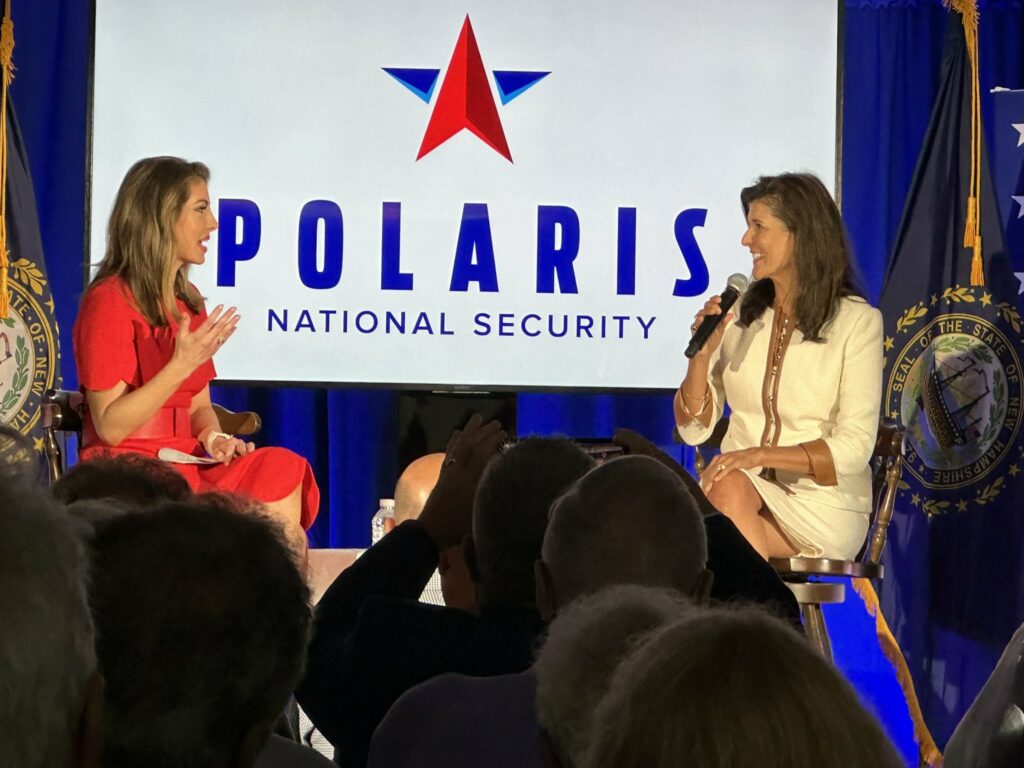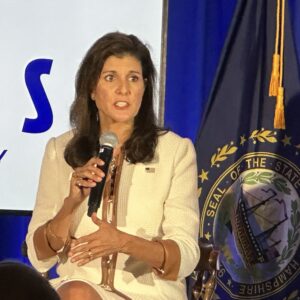At a national security symposium in Portsmouth Wednesday, former U.N. Ambassador Nikki Haley said the rise in international threats to America’s interests can be traced back to the weakness of President Joe Biden and his unsteady foreign policy.
“Yes, China is absolutely our number security threat,” Haley said. “But we can’t look on them from a position of fear.”
Haley addressed a crowd of about 100 people at the “America the Great” tour event hosted by Polaris National Security. Its founder, former State Department spokesperson Morgan Ortagus, moderated the event, asking Haley about China and Russia before turning to the audience for questions.

Haley said the problem with Biden’s China policy is that it is founded on fear, and she pointed to Secretary of State Anthony Blinken’s recent trip to Beijing as an example.
“I don’t mind that he’s meeting with the Chinese,” Haley said. “The problem is the way he went there. He went there after Janet Yellen said, ‘We should be doing more business with China.’ He went there from a weaker standpoint of need: We need to have better relations with China.
“That’s the wrong way to go about it. What [Blinken] should have been saying is, ‘Why are you preparing for war against America? Why are you infiltrating our economy? Why are you putting a spy base up in Cuba? What really happened with COVID?
“There are so many things he needed to say. But from what I’ve seen with the Biden administration, they’re running scared from China. And you never run scared from a dictator,” Haley said.
National radio host Hugh Hewitt also attended, which inspired a question.
“You do know what the Uyghurs are, right?” Ortagus asked Haley.
“They’re not the ‘weebles,’ Haley deadpanned as the crowd laughed.
On Tuesday, Hewitt asked GOP presidential candidate Miami Mayor Francis Suarez if he would be talking about the Uyghurs during his campaign.
“The what?” Suarez asked.
“The Uyghurs,” Hewitt said.
“What’s a Uyghur?” Suarez replied, before joking about looking into “the weebles.”
Haley took the topic of China’s treatment of its Uyghur population — one million Muslims, many living in camps — very seriously.
“They [the Chinese Communist Party] change their names, change their religion. Forced sterilization. Sexual abuse — true genocide,” Haley said. “We promised never again would we turn our backs away from genocide. But because it’s happening in China, everyone’s too scared to say anything. We can never stop talking about the Uyghurs. It really does matter.”
On Russia, Ukraine, and the Wagner Group, Haley predicted Putin would struggle, at least in the short term, because “he doesn’t know who he can trust.” She also said the Russian invasion has been a disaster for the Kremlin and made an unapologetic pitch for continued U.S. support.
“We had no better ally at the United Nations than Ukraine. They were with us on every vote. They stood with me at every press conference, whether I invited them or not,” Haley said.
“Now we have an invasion of this freedom-loving country, and what did they do? The men went to the front lines and fought for their freedoms. The women said, ‘I’m not staying back. I need to help, too.’ They made Molotov cocktails to help their husbands. The world gave these people five days [to survive the invasion], and they so loved their country and their freedoms that they fought to prove everybody wrong,” Haley said.
As for Russia, it has “hit bottom. We know this because they’re getting drones from Iran and missiles from North Korea. That’s as low as it gets.”
The crowd also asked about China policy as well as the need to project U.S. power into space, and concerns about a lack of support for police.
After the event, several attendees agreed that China is problem number one and generally supported Haley’s approach.
“Standing up to China” was a top priority for Dean Kimball of Northhampton, and he liked what he heard from Haley. “China is trying to destroy us economically,” he said.
Natalie Della Rosa of Center Harbor, N.H., also endorsed Haley’s focus on China and U.S. interests abroad but conceded Republican primary voters don’t appear to be motivated by international issues.
“I wish people would vote with foreign policy in mind, but I’m afraid it’s going to get mired down into other things. I wish it would be a priority because she’s very strong in that area,’ Della Rosa said.
And that’s the conversation among GOP activists as well. Haley has a strong message on building U.S. strength, confronting America’s enemies, and showing leadership in the world. But will that message resonate in the current political climate?
In the new St. Anselm College poll of likely GOP primary voters, Haley had the support of just five percent of respondents. Perhaps even more problematic for the Haley campaign, national security and foreign policy issues didn’t break into the top five on the list of priorities for Granite State voters. Just two percent named “Russia/Chinese expansion” as the most important issue in determining how they vote.
But Ray Smoyer of Rye, N.H., said voters must prioritize it.
“I would hope so. The most important job of the president is what? Keeping our nation safe.”




